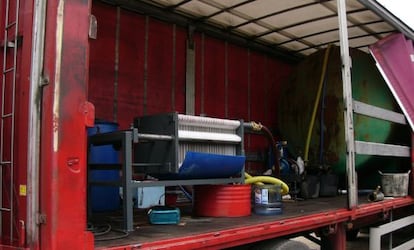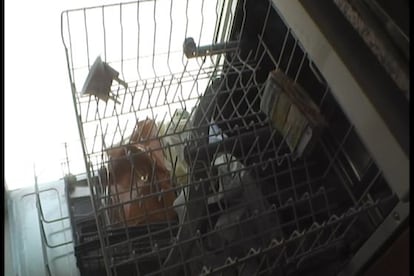Cocaine, kidnapping and multimillion tax fraud uncovered in Spanish diesel scam
Police say gang that sold adulterated fuel across Spain may have had links to drug trade

Spanish police investigating a gang that ran a nationwide scam that sold adulterated diesel to unsuspecting motorists over five years say it may also have been involved in drug dealing and kidnapping.
So far Operation Nehar, which was set up three years ago and involves 750 officers in 11 regions, has arrested more than 100 people and seized more than €1.8 million, as well as blocking hundreds of bank accounts.
Five men suspected of heading the network, which is believed to have adulterated agricultural grade fuel with kerosene, recycled oil and solvents, and then sold it on to gas stations as Type A diesel, are being held in prison. A sixth has been given bail. Police say they have also found large amounts of cocaine, as well as a pistol. The men are accused of tax evasion, fraud, belonging to a criminal conspiracy, forging documents and money laundering. One of the detained is also accused of attempting to kidnap a Salamanca-based businessman – a crime foiled following police surveillance of the gang.
The network was run from the central region of Castilla-La Mancha, and sold the diesel to gas stations, which then announced “low prices” on their forecourts.
Gas station managers would call their suppliers to ask for “sandwiches” when they needed more fuel
The authorities say that such advertisements helped trace the network. The gas stations sold the diesel at €0.93, compared to the going rate of €1.20.
Each cell had its own laboratory for adulterating fuel. The Civil Guard has so far dismantled labs in the provinces of Cuenca, Albacete, Toledo and Córdoba, as well as in the regions of Madrid and Murcia. In Pontevedra, Galicia, the network had a truck that was able to filter marked industrial fuel, which it sold to gas stations. The network is believed to have sold around 450,000 liters of fuel a week.
The operation is ongoing, and is being overseen by a judge based at a court in Illescas, a small town in Toledo province. Police have used wiretaps, and say gas station managers would call their suppliers to ask for “sandwiches” when they needed more fuel. Adulterated diesel was called “chocolate.”
A Civil Guard spokesman said the force had taken great care over the procedures it had followed during the investigation, noting that a previous operation in 2009, which was dubbed Toleum and included many of the same suspects, had to be abandoned after the courts objected to its surveillance methods.
The investigation began in a plant in Yuncos, Toledo, where the network was adulterating B-rated diesel to look like fuel that could be used for vehicles. This lower-grade fuel – along with the C-rated type, also doctored by the gangs – is normally used for farm machinery, fishing boats and heating.
For an average 50-liter tankful of diesel oil, the fraud netted the ring a profit of around €13.

Some of the men arrested over recent days were targeted in the previous operation, say officers at the Customs Surveillance Service, which is based in Quintanar de la Orden, Toledo. The unit has earned a reputation for its success in uncovering scams involving adulterated alcohol and fuel.
This time round, officers used surveillance techniques employed in drug trafficking cases, and have described the gang as “sophisticated.” They focused on the financial side of the operation and in the process collected proof that the gang did not pay sales tax, saying that a network of front companies had been set up that were trading with each other.
Police say that up to €12 million is owed to the Spanish tax office on the sale of the adulterated fuel from the last eight months alone, adding that the scam dates back at least five years.
The Tax Agency also says that local competitors were hit hard by the gang’s tactics, and that even some big players ended up asking to be supplied with adulterated fuel in a bid to hold on to their customers.
Once the case has been heard, and trial dates are announced, the police say they expect an avalanche of lawsuits by motorists against the gas stations involved: adulterated fuel is very harmful to diesel injection systems. A number of vehicle owners have reportedly already contacted gas stations to complain that their injection systems are not working properly. The Civil Guard is convinced that thousands of drivers have unwittingly used the adulterated diesel fuel. The judge overseeing the case says that motorists are no longer at risk, as all the stations suspected of selling adulterated fuel have been shut down until their diesel tanks are cleaned out.







































